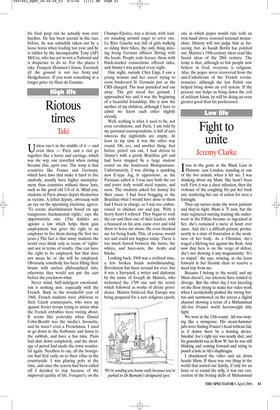Riotous times
Taki
Unless one’s in the middle of it — and even then — Paris and a riot go together like a horse and carriage, which was the way one travelled when rioting became chic, après tout. The irony is that countries like France and Germany, which have laws that make it hard to fire anybody, usually have higher unemployment than countries without these laws, such as the good old US of A. Mind you, students in Paris always depict themselves as victims. A leftist deputy, obviously with an eye on the upcoming elections, agrees. ‘To create discrimination based on age trangresses fundamental rights,’ says the opportunistic one. (The kiddies are against a law which helps them gain employment but gives the right to an employer to fire them during the first two years.) The fact is that many students the world over think only in terms of ‘rights’ and not in terms of results. One can have the right to be employed, but that does not mean he or she will be employed. Obviously somebody has been filling their brains with useless philosophical info, otherwise they would not put the cart before the you-know-what.
Never mind. Self-indulgent emotionalism is nothing new, especially with the French. Back in the wonderful year of 1968, French students were oblivious to their Czech counterparts, who were up against Soviet troops trying to attain what the French crybabies were rioting about. It seems like yesterday when Daniel Cohn-Bendit was the media’s favourite, and he wasn’t even a Frenchman. I used to go down to the Sorbonne and listen to the rubbish, and have a fun time. Paris had shut down completely, and the shortage of petrol had made the town wonderful again. Needless to say, all the bourgoisie had fled early on to their villas in the countryside. I was playing polo at the time, and once the season had been called off I decided to stay because of the improved quality of life. Fouquet’s, on the Champs-Elysées, was a dream, with waiters standing around eager to serve one. Le Rive Gauche was full of girls walking or riding their bikes, the only thing missing being German officers flirting with the locals. People rode horses, those with black-market connections offered rides, and Jimmy’s was packed every night.
One night, outside Chez Lipp, I saw a young woman and her escort trying to cross boulevard St Germain just as the CRS charged. The man panicked and ran away. The girl stood her ground. I approached her and it was the beginning of a beautiful friendship. She is now the mother of my children, although I have to admit we knew each other slightly already.
Well, nothing is what it used to be, not even revolutions, and Paris, I am told by my personal correspondents, is full of cars whereas the nightclubs are empty. At least in my time it was the other way round. Oh, yes, and another thing. Just before petrol ran out, I had driven to Jimmy’s with a pretty Brazilian girl and had been stopped by a large student crowd on the boulevard Montparnasse. Unfortunately, I was driving a spanking new E-type Jag, le sippositoire, as the Parisians called it. I was sure both the car and yours truly would need repairs, and soon. The students asked for money for their cause. I had been bragging to the Brazilian what I would have done to them had I been in charge, so I was too embarrassed to chicken out and pay. With a heavy heart I refused. They began to rock the car and then one of their leaders, with a brassard on his arm, came over and told them to leave me alone. He even thanked me for being frank. This, of course, would not and could not happen today. There is too much hatred between the haves, the whites, and have-nots, the Arabs and blacks.
Looking back, 1968 was a civilised time, a few broken heads notwithstanding. Revolution has been around for ever, but it was a Savoyard, a writer and diplomat by the name of Joseph de Maistre, who welcomed the 1789 one and the terror which followed as works of divine providence. Maistre believed that Europe was being prepared for a new religious epoch, one in which popes would rule with an iron hand above restored national monarchies. History will not judge him as farseeing, but, as Isaiah Berlin has pointed out, Maistre’s 19th-century ideas read like fascist ideas of the 20th century. The irony is that, although so few people now believe in God, everyone is religious. Alas, the popes never recovered from the anti-Catholicism of the French revolutionaries, although the last Polish one helped bring down an evil system. If the present one helps us bring down the evil of militant Islam, he will be doing an even greater good than his predecessor.










































































 Previous page
Previous page